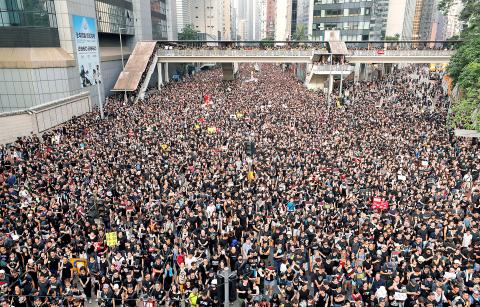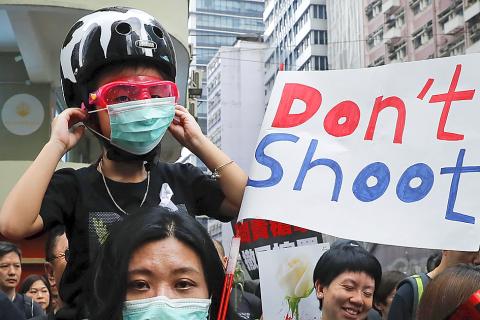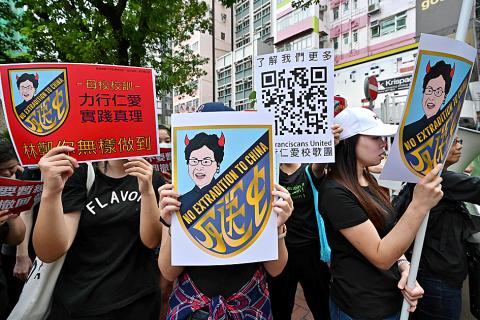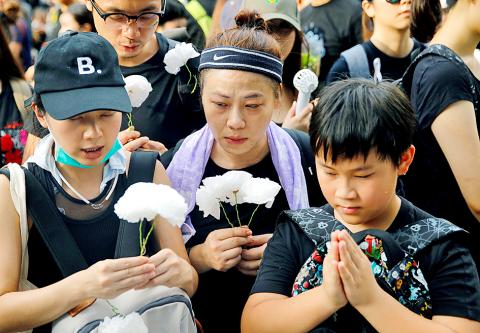In a statement issued last night by her office, Hong Kong Chief Executive Carrie Lam (林鄭月娥) apologized to the public with “utmost sincerity and humility,” after the second massive protest in a week over a proposed extradition bill that would allow people to be sent to mainland China for trial.
Lam’s statement, reiterating that the government has stopped work on the bill, came as hundreds of thousands of people clogged the streets in central Hong Kong dressed in black to demand that she step down, a day after she suspended the bill.
The marchers demanded that Lam first scrap an extradition bill and then resign.

Photo: Reuters
Organizers said the protest might be larger than last week’s demonstration, when they estimated more than 1 million people filed through the central part of Hong Kong Island.
Hong Kong police said that rally drew 240,000 people.
At 7:30pm, five hours after the start of yesterday’s march, thousands of people were still gathering at Victoria Park to begin the nearly 3.2km walk to the Legislative Council building, in the Admiralty district.

Photo: AP
As night fell the huge crowds were still filling multiple major thoroughfares, including outside the legislature, with the police seemingly ceding the streets to the jubilant masses.
“For the public to express their opinions in a peaceful and rational way, the chief executive clearly heard and agreed that this is precisely the spirit of mutual respect and harmony that Hong Kong has always demonstrated as a civilized, free, open and pluralistic society. The government values — and cherishes these core values — of Hong Kong,” the statement from Lam’s office said.
“In view of the strong disparate views of the community, the government has stopped the work of the Legislative Council General on the revision of the Fugitive Offenders Ordinance. It is hoped that this will allow the community to restore calm and avoid any harm. The government reiterated that there is no timetable for restarting the process,” she said.

Photo: AFP
“Many members of the public are disappointed and saddened. The chief executive apologizes to the public and promises to accept it with the utmost sincerity and humility,” she added.
As the crowd choked the official route of the march, protesters began spilling into other roadways, including Harcourt Road in Admiralty and those in the Wan Chai district.
A crowd of people chanted the Cantonese word for “Retract!” over and over, a message to Lam to permanently scrap the bill.

Photo: Reuters
One cafe along the route posted a sign to its front window: “Everyone keep up the hard work ... if you are tired, come in and we’ll give you a glass of water.”
One bright yellow sign carried by a protester in Admiralty read: “HK police force, you should be ashamed to call yourself Hongkongers.” Another read: “Salute to HK young people.”
Earlier in the day, there was a mass rendition of Do You Hear the People Sing?, the anthem from the musical Les Miserables.
The rally drew marchers both young and old, some pushing strollers or carrying slumbering infants. Few wore masks or seemed to be trying to hide their identities, in contrast with demonstrations on Wednesday, when participants expressed worries over possible retribution from the authorities.
Many protesters wore ribbons on their shirts and carried placards showing protesters who had been beaten bloody on Wednesday.
“I’m really sad. I’m grieving,” one visitor, Peron Kwong, said after tying a white ribbon to a street rail. “As a person born and raised in Hong Kong, I’m heartbroken when I see Hong Kong become like this.”
Protesters were also unhappy with the way police handled that situation, with officers using tear gas, rubber bullets and other forceful measures when demonstrators broke through barricades outside the territory government’s headquarters.
The police presence yesterday was considerably more relaxed, with officers deployed mainly to direct traffic as the protesters wound their way through Hong Kong’s commercial center from a sprawling downtown park to government headquarters.
Farther down the parade route, mourners lined up to lay flowers and pay respects at a makeshift memorial for a man who fell to his death on Saturday after hanging a protest banner that read in part, “Make Love, No Shoot” and “No Extradition to China.”
The man slipped from the grasp of rescuers after clinging for a time to scaffolding outside a shopping mall. He was declared dead at a nearby hospital.
Pro-democracy activists were calling for a general strike today, despite Lam’s decision to suspend work on the legislation.
Some labor unions, teachers associations and other groups were planning boycotts of work and classes, demanding the Lam administration retire the proposed amendments and not bring them up again.
Chinese state media yesterday remained largely silent about the protest, with social platforms scrubbed clean of any pictures or mentions of the rally.
However, the Chinese Communist Party mouthpiece, the People’s Daily, said the proposed law was “supported by mainstream public opinion in Hong Kong.
The newspaper added that “the general public “is looking forward to blocking legal loopholes to prevent Hong Kong becoming a haven for sinners.”

CHAOS: Iranians took to the streets playing celebratory music after reports of Khamenei’s death on Saturday, while mourners also gathered in Tehran yesterday Iranian Supreme Leader Ayatollah Ali Khamenei was killed in a major attack on Iran launched by Israel and the US, throwing the future of the Islamic republic into doubt and raising the risk of regional instability. Iranian state television and the state-run IRNA news agency announced the 86-year-old’s death early yesterday. US President Donald Trump said it gave Iranians their “greatest chance” to “take back” their country. The announcements came after a joint US and Israeli aerial bombardment that targeted Iranian military and governmental sites. Trump said the “heavy and pinpoint bombing” would continue through the week or as long

TRUST: The KMT said it respected the US’ timing and considerations, and hoped it would continue to honor its commitments to helping Taiwan bolster its defenses and deterrence US President Donald Trump is delaying a multibillion-dollar arms sale to Taiwan to ensure his visit to Beijing is successful, a New York Times report said. The weapons sales package has stalled in the US Department of State, the report said, citing US officials it did not identify. The White House has told agencies not to push forward ahead of Trump’s meeting with Chinese President Xi Jinping (習近平), it said. The two last month held a phone call to discuss trade and geopolitical flashpoints ahead of the summit. Xi raised the Taiwan issue and urged the US to handle arms sales to

BIG SPENDERS: Foreign investors bought the most Taiwan equities since 2005, signaling confidence that an AI boom would continue to benefit chipmakers Taiwan Semiconductor Manufacturing Co’s (TSMC, 台積電) market capitalization swelled to US$2 trillion for the first time following a 4.25 percent rally in its American depositary receipts (ADR) overnight, putting the world’s biggest contract chipmaker sixth on the list of the world’s biggest companies by market capitalization, just behind Amazon.com Inc. The site CompaniesMarketcap.com ranked TSMC ahead of Saudi Aramco and Meta Platforms Inc. The Taiwanese company’s ADRs on Tuesday surged to US$385.75 on the New York Stock Exchange, as strong demand for artificial intelligence (AI) applications led to chip supply constraints and boost revenue growth to record-breaking levels. Each TSMC ADR represents

State-run CPC Corp, Taiwan (CPC, 台灣中油) yesterday said that it had confirmed on Saturday night with its liquefied natural gas (LNG) and crude oil suppliers that shipments are proceeding as scheduled and that domestic supplies remain unaffected. The CPC yesterday announced the gasoline and diesel prices will rise by NT$0.2 and NT$0.4 per liter, respectively, starting Monday, citing Middle East tensions and blizzards in the eastern United States. CPC also iterated it has been reducing the proportion of crude oil imports from the Middle East and diversifying its supply sources in the past few years in response to geopolitical risks, expanding